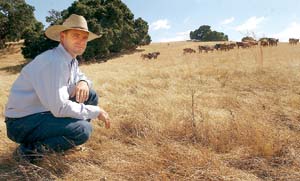
Passionate about the environment and geo-politics, cattle
rancher Joe Morris decided to take a different approach to raising
cattle.
Passionate about the environment and geo-politics, cattle rancher Joe Morris decided to take a different approach to raising cattle.
“As a citizen who loves my country, it’s up to me to take care of the land,” he said.
About seven-years-ago, Morris, who has been raising grain-fed cattle since 1991 and is a fifth-generation farmer, decided to take a select number of his cows and raise them on grass only. A seasonal project, which has the cows graze in a grass pasture during the spring months, Morris said having the cows involved in the natural cycle of life is important to the consumers as well as the environment.
“Our bodies have evolved eating animals that eat grass,” he said. “This is what our bodies expect when we pick up a hamburger.”
Morris explained that when the cattle naturally graze on the grass, the cycle of energy is more efficient
When the cattle live on the grass, they’re fertilizing the ground with their manure, which then allows the plants to provide more energy when the cows consume it, Morris said.
“All of us are part of the ecological process,” he said.
Another aspect of grass-fed beef that motivates Morris, a self-proclaimed environmentalist, is the oil conservation.
“I don’t really like that the country is so reliant on oil,” he said.
When cows are grain-fed there is a lot more oil used, considering the grain has to be collected by machinery, then the cows have to be transported to eat the grain, he explained.
Aside from helping the environment, grass fed beef also has health benefits. All beef is high in protein, iron and zinc, but only grass fed beef is high in beta-carotene, Vitamin E, Omega 3 fatty acids and Conjugated Linoleic Acid. Morris said, his customers, who are located all over San Benito and Monterey counties and some in the bay area, are very concerned with what goes into their food, and the nutrients are an added benefit.
“My customers are very aware of political and environmental issues and very concerned about what they put in their bodies,” he said. “They’re thrilled to be part of the program.”
San Benito County Agriculture Commissioner Paul Matulich said he can see this becoming a trend in the future.
“I think most people would prefer this way if they can do it,” he said.
Cattlemen’s Association President Jeannie Coefield agrees.
“I think there will come a point where natural beef is the way to go,” she said.
Although he continues to primarily raise grain-fed, Morris said he hopes to one day transition the majority of his cows to grass.
“I’m a cowboy, and my first love is the animals and working with the land,” he said.








